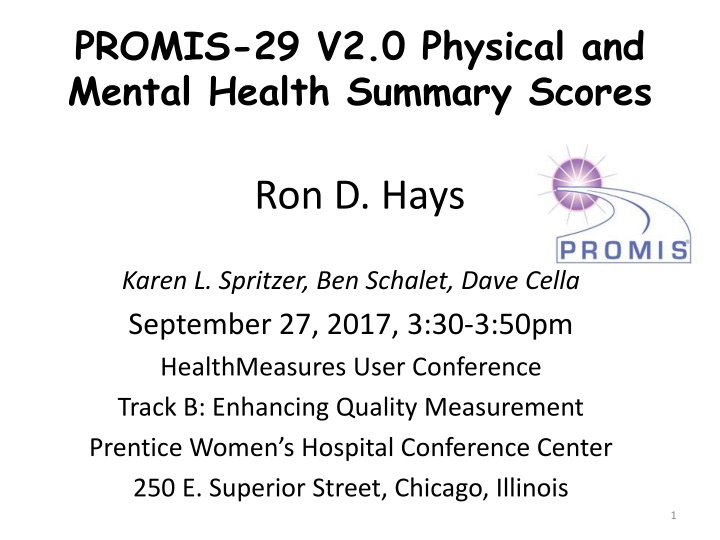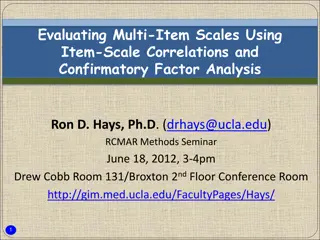
Health Measures: PROMIS-29 V2.0 Physical and Mental Health Summary Scores
Explore the PROMIS-29 V2.0 Physical and Mental Health Summary Scores presented by Ron D. Hays and team. Understand the Ability to participate in social roles, Anxiety, Depressive symptoms, Fatigue, Pain interference, Physical functioning, Sleep disturbance, and Pain intensity ratings. Discover Preference-Based Scores estimated from PROMIS-29 and analysis plans including factor analyses and correlations with other health measures.
Download Presentation

Please find below an Image/Link to download the presentation.
The content on the website is provided AS IS for your information and personal use only. It may not be sold, licensed, or shared on other websites without obtaining consent from the author. If you encounter any issues during the download, it is possible that the publisher has removed the file from their server.
You are allowed to download the files provided on this website for personal or commercial use, subject to the condition that they are used lawfully. All files are the property of their respective owners.
The content on the website is provided AS IS for your information and personal use only. It may not be sold, licensed, or shared on other websites without obtaining consent from the author.
E N D
Presentation Transcript
PROMIS-29 V2.0 Physical and Mental Health Summary Scores Ron D. Hays Karen L. Spritzer, Ben Schalet, Dave Cella September 27, 2017, 3:30-3:50pm HealthMeasures User Conference Track B: Enhancing Quality Measurement Prentice Women s Hospital Conference Center 250 E. Superior Street, Chicago, Illinois 1
PROMIS-29 V 2.0 4 items each Ability to participate in social roles and activities Anxiety Depressive symptoms Fatigue Pain interference Physical functioning Sleep disturbance. Pain intensity with 0 10 numeric rating item 2
Preference-Based Scores Estimated from PROMIS-29 Indirect (mapping to): EQ-5D-3L (Revicki et al., 2009, Qual Life Res) HUI-3 (Hays, Revicki et al., 2016, Qual Life Res) Preference scoring functions Craig et al. (2014, Value in Health) Hanmer et al. (2015, Health Qual Life Outcomes) 3
Sample 1: Op4G Panel n = 3,000 51% female 60% non-Hispanic White, 17% Hispanic, 14% Black, 9% Asian, 1% other Mean age = 46 (range: 18-88 years old) 14% less than high school, 31% high school graduates, 28% some college, 47% college degree 57% married or living with a partner 4
Sample 2: Toluna/Greenfield panel n = 2,000 50% female 81% non-Hispanic White, 6% Hispanic, 7% Black, 4% Asian, 2% other Mean age = 52 (range: 18-93 years old) 3% less than high school, 25% high school graduates, 42% some college, 30% college degree 56% married or living with a partner National Comprehensive Cancer Network-Functional Assessment of Cancer Therapy-Kidney Symptom Index (NFKSI) Study 5
Analysis Plan Exploratory and Confirmatory Factor analyses Reliability Coefficient alpha for multi-item scales Mosier s formula for weighted composites Product-moment correlations among PROMIS-29 scales Associations of PROMIS-29 Summary Scores with: EQ-5D-3L, HUI-3, PROMIS Global Physical and Mental Health, SF-36 PCS and MCS, and number of chronic conditions 6
Results Standardized Parameter Estimates from Confirmatory Factor Analysis Model in Sample 1 Item Physical Mental ------------------------------------------------------------ Physical function 0.952 Pain -0.416 -.456 Social 0.377 0.556 Fatigue -.046 -.820 Emotional distress -.795 Sleep disturbance -.620 ------------------------------------------------------------ Note: Pain is average of pain intensity item and pain interference scale. Emotional distress is average of anxiety and depressive symptoms. Estimated correlation among physical and mental health factors was 0.694 7
Reliability Estimates Measure Sample 1 Sample 2 Physical Functioning 0.91 0.93 Fatigue 0.91 0.95 Pain Interference 0.94 0.86 Depressive Symptoms 0.93 0.95 Anxiety 0.90 0.91 Ability to Participate in Social Roles and Activities 0.93 0.96 Sleep Disturbance 0.77 0.88 PROMIS-29 Physical Health Summary Score 0.94 0.95 PROMIS-29 Mental Health Summary Score 0.97 0.98 8
PROMIS Physical and Mental Health T-scores z-scores = (T-score 50)/10 Pain z-score (pain intensity and pain interference) Emotional z-score (anxiety and depressive symptoms) Summary health T-scores = 10*(Sum of z-scores*scoring coefficients) + 50 Higher score is better health 9
Descriptive Statistics for PROMIS-29 Physical and Mental Health Summary Scores in Sample 1 Variable Mean SD Minimum Maximum ----------------------------------------------------------- PROMIS-29 Physical 46.32 9.23 21.60 62.45 PROMIS-29 Mental 45.66 9.49 19.53 62.34 PROMIS Global Physical 44.84 9.40 16.04 67.69 PROMIS Global Mental 46.55 9.70 21.13 67.64 ----------------------------------------------------------- Note: First two rows are summary scores for PROMIS-29; last two rows are PROMIS global health scale scores. Descriptive Statistics for PROMIS-29 Physical and Mental Health Summary Scores in Sample 2 Variable Mean SD Minimum Maximum ----------------------------------------------------------- PROMIS-29 Physical 48.63 8.95 22.27 61.92 PROMIS-29 Mental 50.20 9.16 20.44 62.24 SF-36 PCS 46.12 11.24 8.27 69.38 SF-36 MCS 47.68 12.34 -3.59 71.70 ----------------------------------------------------------- Note: First two rows are summary scores for PROMIS-29; last two rows are SF-36 physical component summary (PCS) and mental component summary (MCS) scores. 10
Product-Moment Correlations Among PROMIS-29 Scales (Sample 1) Pain interference function Physical Pain intensity Ability to participate in social roles Anxiety Depressive symptoms Fatigue Pain interference Physical function Pain intensity Ability to participate in social roles Anxiety Depressive symptoms Fatigue Sleep disturbance Product-Moment Correlations Among PROMIS-29 Scales (Sample 2) Pain interference function 1.000 -.739 0.673 -.747 1.000 -.556 0.726 1.000 -.539 1.000 0.586 0.591 -.504 -.504 0.452 0.446 -.636 -.630 1.000 0.819 1.000 0.670 0.492 -.586 -.402 0.515 0.415 -.710 -.466 0.643 0.466 0.634 0.476 1.000 0.543 Physical Pain intensity Satisfaction with participation in social roles Anxiety Depressive symptoms Fatigue Pain interference Physical function Pain intensity Satisfaction with participation in social roles Anxiety Depressive symptoms Fatigue Sleep disturbance 1.000 -.605 0.780 -.490 1.000 -.631 0.620 1.000 -.545 1.000 11 0.400 0.404 -.311 -.335 0.434 0.436 -.446 -.478 1.000 0.806 1.000 0.546 0.428 -.547 -.352 0.583 0.484 -.613 -.516 0.580 0.490 0.617 0.531 1.000 0.618
Correlations of Physical and Mental Health Summary Scores with Other Variables (Sample 1) PROMIS-29 Physical Health Summary Score PROMIS-29 Mental Health Summary Score EQ-5D-3L (predicted from PROMIS global health items) 0.82 0.73 HUI-3 0.73 0.67 PROMIS Global Physical 0.80 0.66 PROMIS Global Mental 0.58 0.64 Number of Chronic Conditions -.50 -.45 Hypertension, angina, coronary artery disease, heart failure, heart attack, stroke, liver disease, kidney disease, arthritis, migraines, asthma, chronic lung disease, diabetes, cancer, depression, anxiety, alcohol or drug problem, sleep disorder, HIV/AIDS, spinal cord injury,and multiple sclerosis. 12
Correlations of Physical and Mental Health Summary Scores with Other Variables (Sample 2) PROMIS-29 Physical Health Summary Score PROMIS-29 Mental Health Summary Score SF-36 Physical Component Score 0.82 0.38 SF-36 Mental Component Score 0.54 0.82 Number of Chronic Conditions -.53 -.42 Hypertension, angina, coronary artery disease, heart failure, heart attack, stroke, liver disease, kidney disease, arthritis, migraines, asthma, chronic lung disease, diabetes, cancer, depression, anxiety, alcohol or drug problem, sleep disorder, HIV/AIDS, and multiple sclerosis. 13
Largest Associations with Chronic Conditions (Sample 1) PROMIS-29 Physical Health Means Multiple Sclerosis ( ? = 36 vs. 46) Arthritis or Rheumatism ( ? = 41 vs. 47) Angina ( ? = 39 vs. 47) Heart Failure or CHF ( ? = 38 vs. 46) PROMIS-29 Mental Health Means Depression ( ? = 41 vs 49) Anxiety ( ? = 41 vs 48) Sleep disorder ( ? = 41 vs 48) Angina ( ? = 41 vs. 48) 14
Conclusions These studies provide support for the reliability and validity of the PROMIS-29 Physical and Mental Health Summary scores. Further work is needed to evaluate these summary scores in other samples. Alternative scoring approaches such as higher- order factor models should be explored. 15
Funding for HealthMeasures was provided by the National Institutes of Health grant U2C CA186878.

